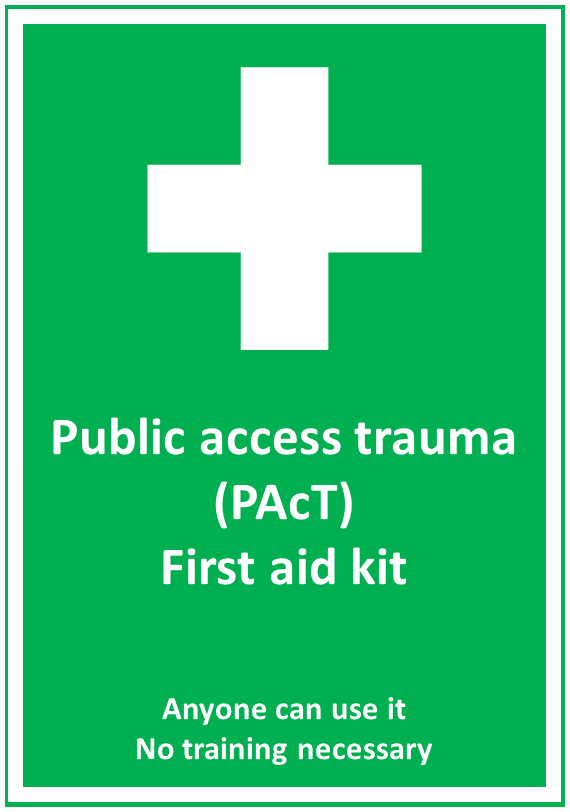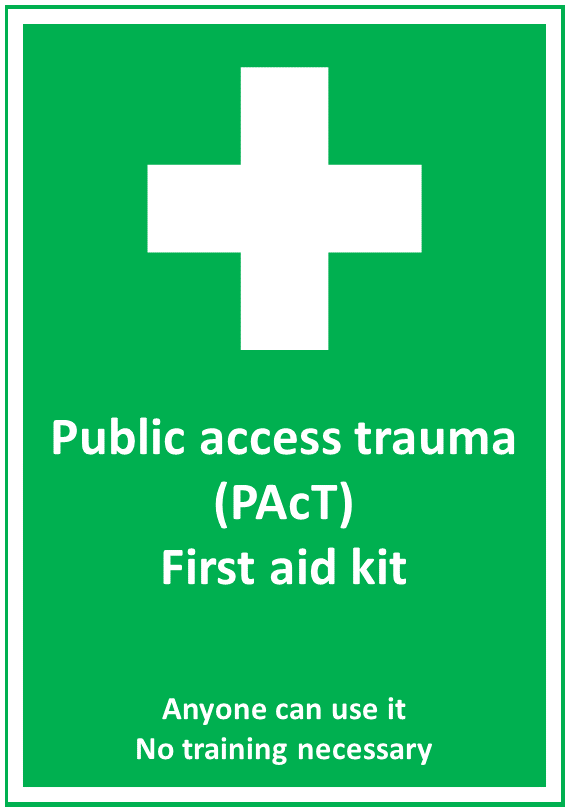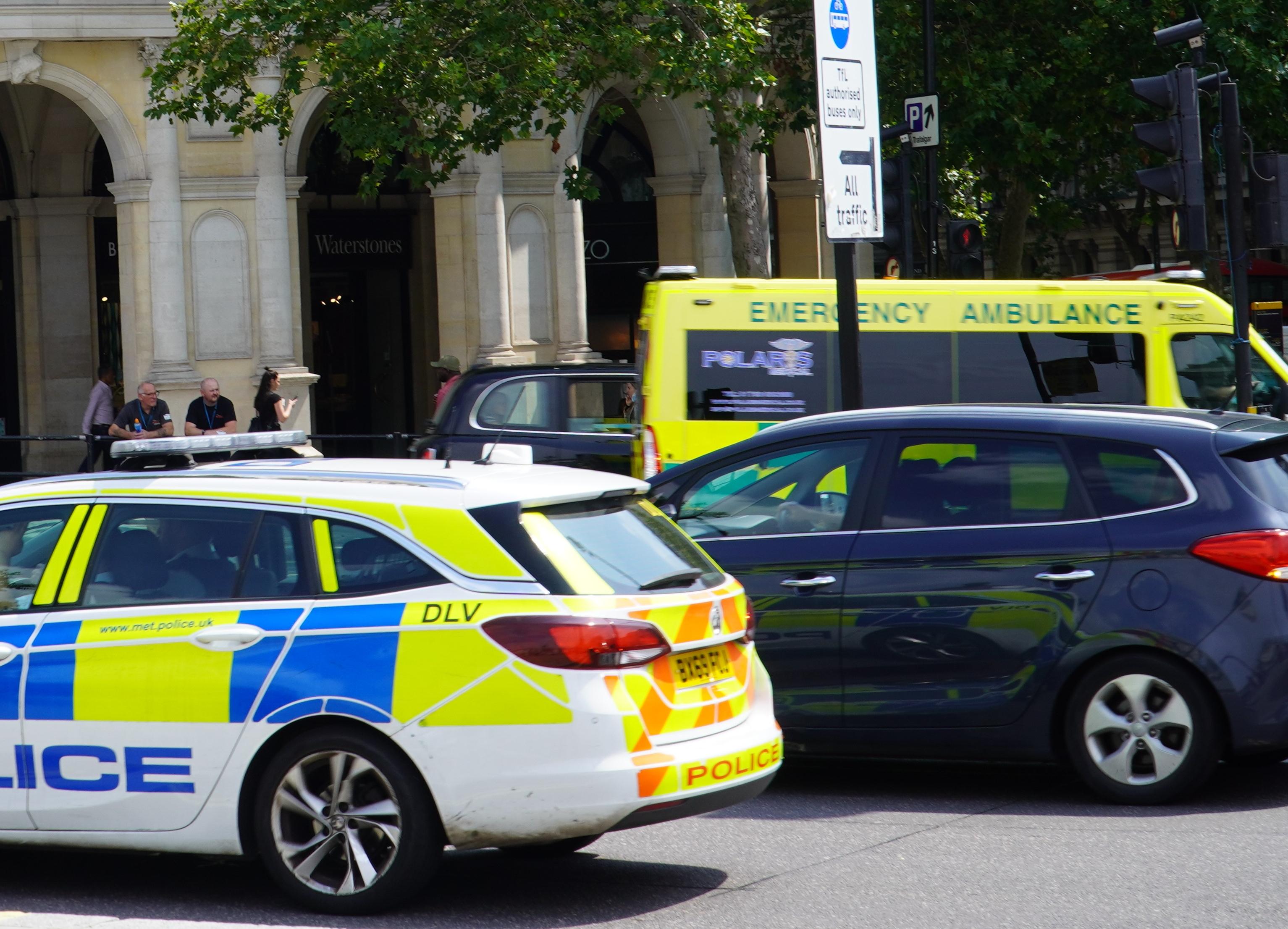Accessibility, storage and content
A PAcT First Aid Kit should be:
- located in areas to which the public can access
- Easily identifiable in a coloured, sealed pack/container, clearly labelled 'Public Access Trauma First Aid Kit' with a clearly visible white cross on the front
Located with the universally agreed signage below for these kits (Portrait 200 x 300 mm)

At a minimum, contain the following items:
| Kit Item | Item Description | Quantity |
|---|---|---|
| 1 | Personal Protective Equipment Disposable gloves (x4 pairs), disposable glasses, disposable face mask | 4 sets |
| 2 | Tuff Cut Scissors | 2 |
| 3 | Large Trauma Wound Dressing | 4 |
| 4 | Woven Triangular Bandage | 2 |
| 5 | Tourniquet | 2 |
| 6 | CPR Face Shield | 2 |
| 7 | Indelible Marker Pen | 2 |
| 8 | Tourniquet application memoire and recovery position information | 2 |
Public Access Trauma (PAcT) First Aid Kit Signage
Public Access Trauma (PAcT) First Aid Kits should be located alongside the new universally agreed Public Access Trauma (PAcT) First Aid Kit sign to ensure they are clearly identifiable as such to all and are able to be distinguished from other forms of first aid provision.
The sign can be obtained with the kit from first aid suppliers and a copy of the sign is shown below

Legalities
The Health and Safety (First-Aid) Regulations 1981 (Click Link) requires employers to provide adequate and appropriate equipment, facilities and personnel to ensure their employees receive immediate attention if they are injured or taken ill at work. The Health and Safety at Work Act 1974 - Section 3 (Click link) requires employers to also consider the health and safety of others not employed whilst using their facilities. In addition, the Health and Safety Executive strongly recommends that non-employees are included in any assessment and that first aid provision is made for them.
How to achieve good practice
Organisations should:
- ensure the kit is included within, and forms part of an organisations First Aid Needs Assessment
- have in place a formal risk based process which determines the best location for these kits
- embed the name “Public Access Trauma First Aid Kit” and “PAcT First Aid Kit” within the first aid culture of the organisation
- ensure all individuals within the premises are aware of the kit location, use and contents
How to achieve leading practice
Organisations should:
- have a clearly defined process for consulting and sharing the location of the kits with neighbouring organisations and emergency services
- ensure the kits form an integral part of an organisations first aid response plan
- hold specific contingency plans which take into account the likely circumstances which may require the use of these kits.
- have an agreed understanding that these kits may be used by emergency services on those occasions where they need it to supplement their own kit
- ensure the kits form part of a first aid exercise programme where relevant lessons are identified and reflected in updated plans and arrangements
- ensure that sufficient staff have received additional awareness training in the use of these kits.
Further guidance and supporting documentation
ProtectUK - the National Counter Terrorism Security Officer has supporting information on first aid reponse and Public Access Trauma First Aid Kits and guidance on increasing the protection and response preparedness of venues and public spaces in the event of a terrorist attack.
St John Ambulance – Accredited first aid training and suppliers of first aid products
citizenAID - Free information on how to stay safe and treat casualties before the 999 services arrive. Suppliers of first aid products
Resuscitation Council UK – Information on CPR and automated external defibrillators (AED)
British Heart Foundation – Information on defibrillators
Health & Safety Executive – Guidance for employers on first aid
2023 National Risk Register The National Risk Register 2023 outlines the key malicious and non-malicious risks that could affect the UK, and provides resilience guidance to the public.

